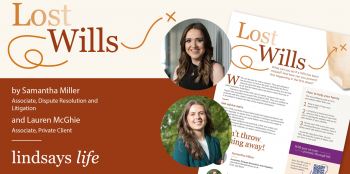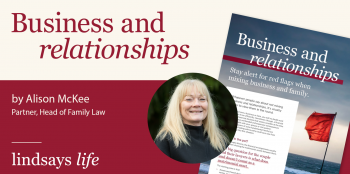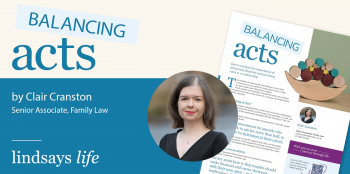How do I manage the cost of divorce when money’s tight?
Continued financial pressures are adding to the strain on some couples - potentially stopping them from separating or divorcing. Caroline Mackintosh, Partner newly appointed in our Family Law team in Perth, believes the anticipated expense of separation as the impact of rising bills bites is causing some to put the brakes on ending their relationship, impinging on their happiness and wellbeing.
The fear of high legal fees - on top of supporting two separate households - at a time of wider continued economic uncertainty on the back of high interest rates and the cost of living crisis is a factor some are considering.
But, for those who have decided that separation is best for them and their families, she and colleagues are advising that one of the most practical ways in which to minimise costs is for couples to talk and reach as much agreement as possible themselves.
Caroline said: “It’s important that couples who want to separate can. The best way for them to do that without adding further financial strain is to obtain advice on possible parameters of settlement and the practical constraints which may apply and then to try and reach as much agreement as they can themselves, before bringing lawyers in.”
A process known as collaborative law - widely credited with better helping people to secure matrimonial assets more fairly is also becoming increasingly common and is encouraged by Lindsays in appropriate cases.
Divorce is sometimes for the best
“No-one likes to see a marriage come to an end. For some, though, divorce is the best course for them,” added Caroline, who recently joined the Family Law team at Lindsays after almost four years as a solicitor with the Scottish Government.
“It’s ultimately an uncertain time, which no-one likes. Unfortunately, rising living costs have added another layer of uncertainty which we know is causing concern among people considering their next step.
“Some we’ve spoken with are worried about how they can fund the cost of two households. They’re worried enough about all of that before factoring in legal fees and what any final separation settlement may look like.
“No-one would wish for anyone to feel as though they are trapped in an unhappy marriage. That can be more damaging for their personal health and wellbeing, as well as for any children of the relationship .
How to avoid ending up in court
While all cases are unique, financial arrangements are generally where couples find they need professional guidance.
But Lindsays say those who reach the most workable agreements are those who manage to avoid the courtroom.
“The more certainty you can bring to your situation, the better,” Caroline added. “If you can come to an amicable, negotiated agreement, it means that you can be much more creative, tailoring the solution to fit your exact circumstances and giving you much more control over events than if you were in the hands of a court, where a decision can simply be imposed.”
Among the tactics the firm deploys to reach a settlement is collaborative law, where lawyers - and perhaps experts including financial advisors and family consultants - sit around a table with couples in an attempt to resolve more challenging issues.
Caroline, a trained collaborative lawyer, said: “If there are emotional hotspots causing a blockage to sensible financial negotiation, for example, this gives a forum for these to be aired, recognised and dealt with so that things can move on.
“If working by negotiation, you can be creative, taking account of circumstances such as tax implications and the practicalities of implementing an agreement. It’s better - and more cost-effective - for everyone.”
As the collaborative princess involves a specially-trained lawyer, financial advisor and family consultant, couples can also avoid both paying their own experts separately, to then start negotiations from a further apart position.
This article featured online with the Courier on Friday 9 February 2024.






